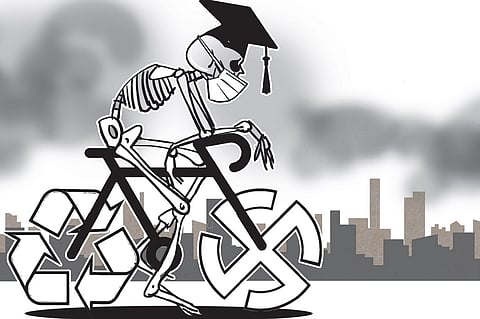In order to get out of man-made hell, rules need to be respected and enforced
Who is an ideal voter for any politician? The answer is anyone who is living in a place where the air is hazardous to breathe, where roads are filled with potholes and dust, where water bodies catch fire and fume and froth with toxic chemicals, where plastic and filth chock the drains and are strewn everywhere.
Anyone who can spend three to four hours a day commuting, negotiating with angry commuters bubbling with frustration and road rage for keeping a non-filling, overworked, underpaid job, paying exorbitant rentals, worried about the future of the children who have to face staggering levels of unemployment, struggling to live in cities having crumbling infrastructure and public health, rickety buses and crowded trains for public transport and yet feeling proud and patriotic about this shit hole and are ready to be lectured about the need to work for seven days a week and 100 hours a day by billionaire tycoons deserve to be fooled and exploited by any run of the mill politician.
The descriptions of hell in many ancient religious scriptures are remarkably similar. They are so like the descriptions of how Indian cities are now that one wonders whether the people who imagined hell many thousand years ago had time-travelled to modern-day Delhi or other Indian cities. Come November, the news about smog, dust, and pollution starts hogging the headlines.
Our cities and towns, especially of the Gangetic plains and the metropolitan cities across the country, are covered in a shroud of toxic gases and fine dust that would have been considered hazardous in a Nazi gas chamber. The ‘experts’ make merry, debating and arguing the cause of smog as if this is an isolated issue and offer bizarre solutions that the authorities neither listen to nor care about. Depending on the political inclination of the experts, the cause of air pollution in North Indian plains could be any of the following.
People burst crackers during a few days of Diwali celebrations and thus make the air toxic for the next four months. Farmers burn stubble to plant the next crop for around one to two weeks, and this is the primary reason for pollution for the entire season, argues another set of experts. Experiments like allowing vehicles with odd and even registration numbers to take turns polluting the cities on alternate days are implemented, but pollution marches on to unheard-of levels. Construction dust is blamed for pollution, but even remote hamlets far from major cities are choking in poisonous air.
Burning of biofuels is another suspect, but didn’t the government claim to have converted every home to LPG through the much-touted Ujjwala Yojana a few years back? Public transport was blamed to be another culprit, and huge expenses were incurred to convert all-diesel buses in Delhi to CNG, and a considerable number of electric vehicles ply the roads. Yet, the pollution markers are racing upwards. In short, no one knows what the hell is causing this issue and has no clue how to tackle it. The truth is that all these and many more could contribute to making us live in this perfect hell, but they are mere symptoms.
The atmosphere isn’t India’s only contaminated resource despite receiving the most attention. We permit factories to discharge their waste into rivers and streams, let agricultural workers saturate their land and produce with chemicals, turn a blind eye when highway builders deliver inferior pavement that disintegrates after minimal rainfall, overlook the building industry’s constant regulation violations, tolerate endless noise pollution from vehicle horns on the streets, and do nothing to stop widespread trash disposal—the list continues endlessly.
The root cause is the failure of law and order. Law and order is not just crime prevention, which, too, we have failed miserably. It also involves ensuring that each citizen respects the law, and those who don’t show consideration to others and the environment and violate them for profit or indifference face severe punitive consequences.
Our cities and towns are what they are because we have failed to implement laws strictly and fairly. The culture of getting away with violations by paying bribes, using influence, or playing the victim card has become so entrenched that we consider it normal. When someone points out a violation, we retort by saying everyone does it, so what’s the big deal? This attitude leads to a race to the bottom, where everyone competes to break the rules with impunity.
The solution is not rocket science. We need to implement existing laws strictly and fairly. But this is easier said than done. The political class benefits from weak law enforcement. A population struggling with basic survival needs is less likely to question their leaders’ actions or demand accountability. They are more likely to fall for emotional appeals and vote based on identity rather than performance. The business class benefits from weak regulations as they allow them to maximise profits by cutting corners and externalising costs to society.
The way forward is to recognise that we are in this mess because we allowed it to happen. We need to demand better from our leaders and ourselves. We need to stop making excuses for violations and start reporting them. We need to support strict enforcement of laws even when it inconveniences us. Most importantly, we need to understand that living in a lawful society benefits everyone in the long run.
The choice is ours. We can continue to live in this man-made hell and pretend everything is fine, or we can work towards creating a society where rules are respected and enforced. The air we breathe, the water we drink, and the quality of life we lead depend on this choice.
Anand Neelakantan
Author of Asura, Ajaya series, Vanara and Bahubali trilogy
mail@asura.co.in

